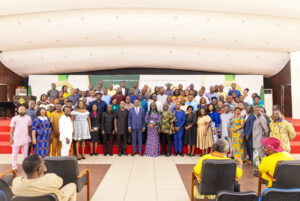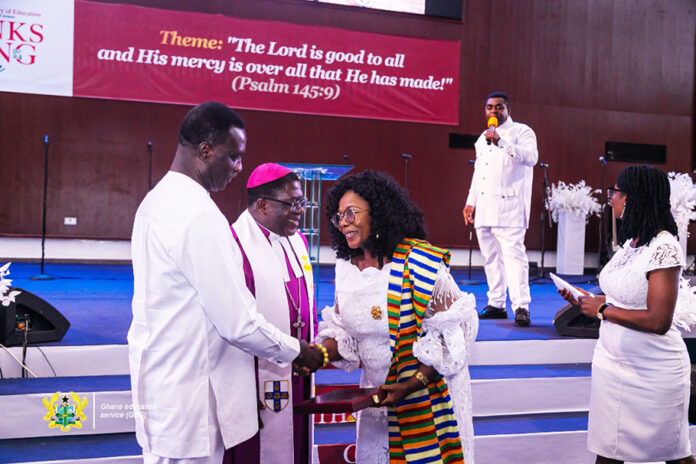The Ghana Tertiary Education Commission (GTEC) has started a policy dialogue that seeks to establish a policy framework for transnational education in the country.
The policy dialogue being done in collaboration with the British Council is geared towards engaging all stakeholders in the tertiary education space to come out with a policy framework to regulate the transnational education space in the country.
Speaking at the opening of a two-day transnational education dialogue at the Kwame Nkrumah University of Science and Technology (KNUST), the Director General of GTEC, Prof. Ahmed Jinapor Abdulai explained that the increasing number of institutions outside the country, expressing interest in operating in the country, triggered the need to get a framework in place to regulate their operations.

He was upbeat that all stakeholders in the sector would contribute their quota towards getting the best ideas and suggestions that would help come out with the right policy to operationalise the trans-national education space in the country.
In attendance are Vice Chancellors of Traditional Universities, Vice Chancellors of Technical Universities, Council of Independent Universities, Principals of Colleges of Education, Registrars and College of Education Secretaries, Directors of Academic Affairs, Directors of Quality Assurance and Academic Planning among others.
Prof Jinapor stated that Ghana was one of the most attractive destinations when it comes to tertiary education, attributing these to the peace and conducive environment in the country, availability of reliable electricity, security situation, the nation’s democratic credentials, qualified staff and faculties to teach were among the reasons most foreign institutions feel comfortable doing business in Ghana.
He eulogised the British Council for its support to GTEC, lauding the Country Director, Mr Doodo Dodoo for his interest and supporting the agenda of GTEC in terms of establishing collaboration and dialogue among our different stakeholders.
He also commended VCs of Traditional Universities, as well as VCs of Technical Universities, Principals of Colleges of Education and other stakeholders for their special roles in helping shape the development of education in the country.
The Country Director of the British Council, Ghana, Mr Doodo, was happy to be part of the programme as he would be sharing some of the experiences of British institutions on transnational education with those in the country.
He indicated throwing in some seed funding towards the establishment of the policy framework and guidance as well as helping share those experiences with Ghanaian institutions.
The Country Director indicated that the collation of the views of stakeholders will help with the establishment of a policy framework to help regulate the sector which could also be replicated by other countries willing to learn from Ghana.

Prof. Kwame Boafo Arthur, Board Chairman for GTEC, said, transnational education plays a critical role in the global exchange of knowledge, fostering cultural understanding, and preparing individuals for the challenges of an interconnected world”.
He explained that “as we navigate the complexities of this landscape, it becomes imperative for us to join hands, share insight, and create a robust framework that prioritizes collaboration and quality assurance.”
The Vice Chancellor of KNUST, Prof. Mrs Rita Akosua Dickson said that the transnational education development in the country would not only help train many people for the nation’s manpower needs but for the global market as well.
She lauded the GTEC and the British Council for their collaboration towards the policy dialogue which stood the chance to promote the development and transformation of nations through education.
Investment in education
In another development, the GNA is quoting the Minister for Education, Dr Yaw Osei Adutwum as saying government’s investment in education has resulted in an increase in school enrolment and envisaged learning outcomes.
He said the Free Senior High School (SHS) introduced in 2017 has increased admission from 800,000 students to over 1.2 million students.
The interventions, he stressed, had led to improvements in the West African Senior Secondary Examinations test scores, of which the average performance improved from 38.73 per cent in 2006 to 69.73 per cent in 2023.
The Minister said this on Friday at a Thanksgiving Service organised by the Ministry of Education on the theme: “The Lord is Good to all and His Mercy is Overall that He has Made.”
He said education played a key role in the country’s transformation and that it behooved them to thank God for the mercies bestowed on the Ministry.
The Minister, also the Member of Parliament for Bosomtwe, in Ashanti, thanked President Akufo-Addo for the confidence he reposed in him.
“We have gone beyond our manifestos. We have promised Free SHS and added free Technical and Vocational Education Training,” he said.
He said the Ministry would continue to work hard to replicate the sterling performances of Wesley Girls’ SHS in other schools for holistic learning outcomes.
Dr Adutwum said the Ministry had engaged the services of retired headmasters and headmistresses to mentor teachers to give of their best.
“We need to move away from our fixed minds to progressive minds and believe that everything is possible with focus and determination,” he said.
On school infrastructure, he said the Government had started the construction of schools in the Ashanti, Northern, and other regions to improve learning outcomes.
“We have started construction of model Junior High School (JHS) and community schools from kindergarten to the JHS level with science laboratories and equipment,” he said.
Dr Adutwum stated that in April 2024, the Government would commission the projects to enroll students for the new academic year in September.
He said the Government had constructed new STEM schools across the country, including Accra High School and Abomosu, to compete with the rest of the world.
He commended the efforts and resilience of the staff of agencies under the Ministry to achieve such a great milestone in the educational space.
Dr Christian Addai-Poku, Registrar, National Teaching Council, commended the visionary leadership of the Minister, saying, “You are so good that everyone sees your vision and follows you.”
Most Reverend Dr Paul Kwabena Boafo, Bishop of Methodist Church, Ghana and Reverend John Fordjour, Deputy Minister in Charge of General Education, prayed for peaceful elections and success for the Ministry.
The Minister presented a plaque and an undisclosed amount of money to some former headmasters and headmistresses of SHSs for their selfless contributions to education.
By Felix Baidoo
Source: GNA








